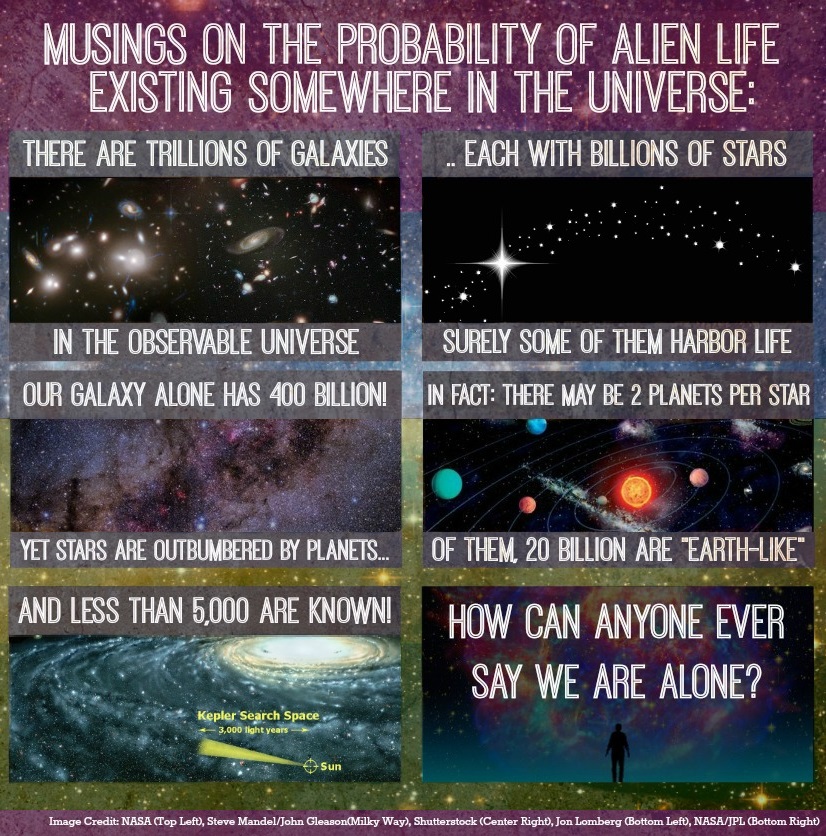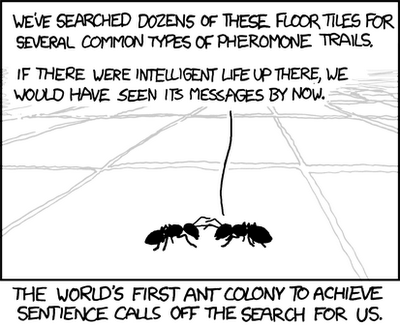
Question:
“The fermi paradox confuses me. If it’s that probable that intelligent beings live on other worlds, then surely it’s more to do with the fact that we haven’t found them yet and not that there are none. To me, that is no paradox, it’s just humans not perceiving said “aliens”….can you explain the paradox more please?”
Asked by: Kat Tomlinson
Answer:

Let me first elaborate on the paradox itself real quick. When we look out at the universe, we see ample material and sufficient processes to generate tons of alien life. Even using our lowest and most pessimistic estimates, we estimate there are billions of intelligent civilizations running around in the universe. Conceptually, with so many alien civilizations running around, humans should have been contacted or, at minimum, we should have found evidence of someone by now.Fermi’s paradox addresses that apparent contradiction between our estimates and lack of evidence for aliens, attempting to answer the question, “Where is everyone?”
Fermi starts by making some basic points for the foundation of his argument. Firstly, he notes the Sun is young compared to other stars in the galaxy, some of which, are billions of years older than ours is. Of course, the second argument stems rather naturally. It states that a fraction of these stars are bound to have habitable planets in their orbital grasp. Of these planets, some of them seem certain to have developed life (maybe even some of that life evolved into intelligence). Finally, at any reasonable speed, it would only take a few tens of millions of years to colonize the entire galaxy. Again, we come to the problem, with so many proposed alien civilizations, where is everyone?
The Heart of the Issue:
It’s possible that the universe just hasn’t existed long enough for really advanced civilizations to have evolved just yet. If everyone is about the same technological page as Earth, we don’t have the technology to detect them (yet). It’s also possible that no other alien civilizations exist. Proponents of this argument (see the Rare Earth Hypothesis) argue that the conditions for life (or, more specifically, intelligent life) are so complex that it rarely happens. The even more pessimistic viewpoint says that intelligent life has only arisen on Earth to date.

Most of the other answers to resolve the paradox rely on using Earth as a template to predict how life in the universe behaves. So, there will be some amount of “anthropocentricism” woven into the arguments. One of the greatest things I’ve heard said on the topic, to loosely paraphrase, was, “Using Earth as a template for life in the universe is life finding a fish in the ocean and, from that single fish, trying to predict the diversity of life the ocean contains.”
Are we following in their footsteps?
Intelligent life might also be destined to destroy itself. Even if you live under a rock, you’ll realize that the past century has been very dangerous in human history. Today, multiple nations posses the power to destroy habitability on Earth with a push of a button. Even if you look past total war, you’ll see the affects of the industrial and modern eras on the environment. Being ignorant and uncaring, humans have managed to reshape the environment for the worse – we are only just realizing the effects of our efforts over the last few centuries. It’s possible this is a milestone in the evolution of any advancing civilization. It’s also possible this is a milestone that manages to wipe many such civilizations from the universe.
If life doesn’t destroy itself, it’s possible life will seek to destroy other life. Large scale interstellar war between alien species where the end result is the extermination of the weaker species. From here, we have two possibilities. The more likely is the few alien civilizations on the top of the food chain smother and destroy up-and-coming civilizations as they announce their existence to the universe (mostly by accident, such as the usage of radio waves). The second and, in my opinion, the least likely, is up-and-coming civilizations do everything in their power to remain quiet as to avoid detection (perhaps for the same reason that many among us believe shouting our location from beyond Earth’s horizon could lead to a hostile alien takeover)
Then again, alien civilizations could be common and we just don’t see any evidence of their existence. Perhaps intelligent civilizations are too diffuse for us to contact one another (or, see one another). Maybe spreading throughout the galaxy is prohibitively expensive. We might also have problems with our searching techniques, looking for methods of communication the aliens aren’t using.

After all, if I’m using telepathy to communicate, you will not ‘listen in’ with your radio telescopes. Also, consider that humanity has only really been looking for intelligent life for about 50 years – so, we might have not been looking long enough. The aliens might be non-technological in nature, ‘too alien’ to identify, or they could be shielding Earth from receiving outside signals (using a Prime Directive set of rules governing when to make first contact).
The list of possible solutions to the paradox is practically endless. The easiest solution to the paradox would be to find evidence of an extraterrestrial civilization.
Two radical solutions to the Fermi paradox posit that aliens could be hiding out in supermassive black holes, or they could have built a Dyson sphere that helps them escape detection.